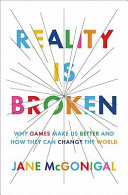Characteristics of a Game
When you strip away the genre differences and the technological complexities, all games share four defining traits: a goal, rules, a feedback system, and voluntary participation.
The goal is the specific outcome that players will work to achieve. It focuses their attention and continually orients their participation throughout the game. The goal provides players with a sense of purpose.
The rules place limitations on how players can achieve the goal. By removing or limiting the obvious ways of getting to the goal, the rules push players to explore previously uncharted possibility spaces. They unleash creativity and foster strategic thinking.
The feedback system tells players how close they are to achieving the goal. It can take the form of points, levels, a score, or a progress bar. Or, in its most basic form, the feedback system can be as simple as the players’ knowledge of an objective outcome: “The game is over when . . .” Real-time feedback serves as a promise to the players that the goal is definitely achievable, and it provides motivation to keep playing.
Finally, voluntary participation requires that everyone who is playing the game knowingly and willingly accepts the goal, the rules, and the feedback. Knowingness establishes common ground for multiple people to play together. And the freedom to enter or leave a game at will ensures that intentionally stressful and challenging work is experienced as safe and pleasurable activity.
Notes:
Folksonomies: gamification
Taxonomies:
/hobbies and interests/guitar (0.529892)
/shopping/resources/warranties and service contracts (0.446886)
/technology and computing/software/shareware and freeware (0.408574)
Keywords:
voluntary participation (0.993735 (positive:0.426549)), goal (0.887134 (positive:0.101089)), uncharted possibility spaces (0.876891 (neutral:0.000000)), foster strategic thinking (0.853411 (neutral:0.000000)), players (0.792485 (positive:0.152128)), feedback (0.679719 (positive:0.419894)), technological complexities (0.592008 (positive:0.262930)), defining traits (0.578409 (neutral:0.000000)), genre differences (0.565652 (positive:0.262930)), Real-time feedback (0.560211 (positive:0.325784)), specific outcome (0.559074 (neutral:0.000000)), obvious ways (0.532767 (negative:-0.535981)), objective outcome (0.513071 (positive:0.456766)), progress bar (0.490672 (neutral:0.000000)), common ground (0.486016 (positive:0.608425)), multiple people (0.485505 (positive:0.608425)), challenging work (0.474977 (positive:0.805981)), basic form (0.470180 (positive:0.511216)), rules (0.466684 (negative:-0.397425)), game (0.428048 (positive:0.315752)), orients (0.225657 (positive:0.620187))
Concepts:
Play (0.980120): dbpedia | freebase | opencyc
Game (0.979402): dbpedia | freebase | opencyc
Regulatory Focus Theory (0.651146): dbpedia
Toy (0.642456): dbpedia | freebase | opencyc
Games (0.627420): dbpedia
The Players (0.560700): dbpedia
Common Ground (0.557540): dbpedia
Feedback (0.545580): dbpedia | freebase





